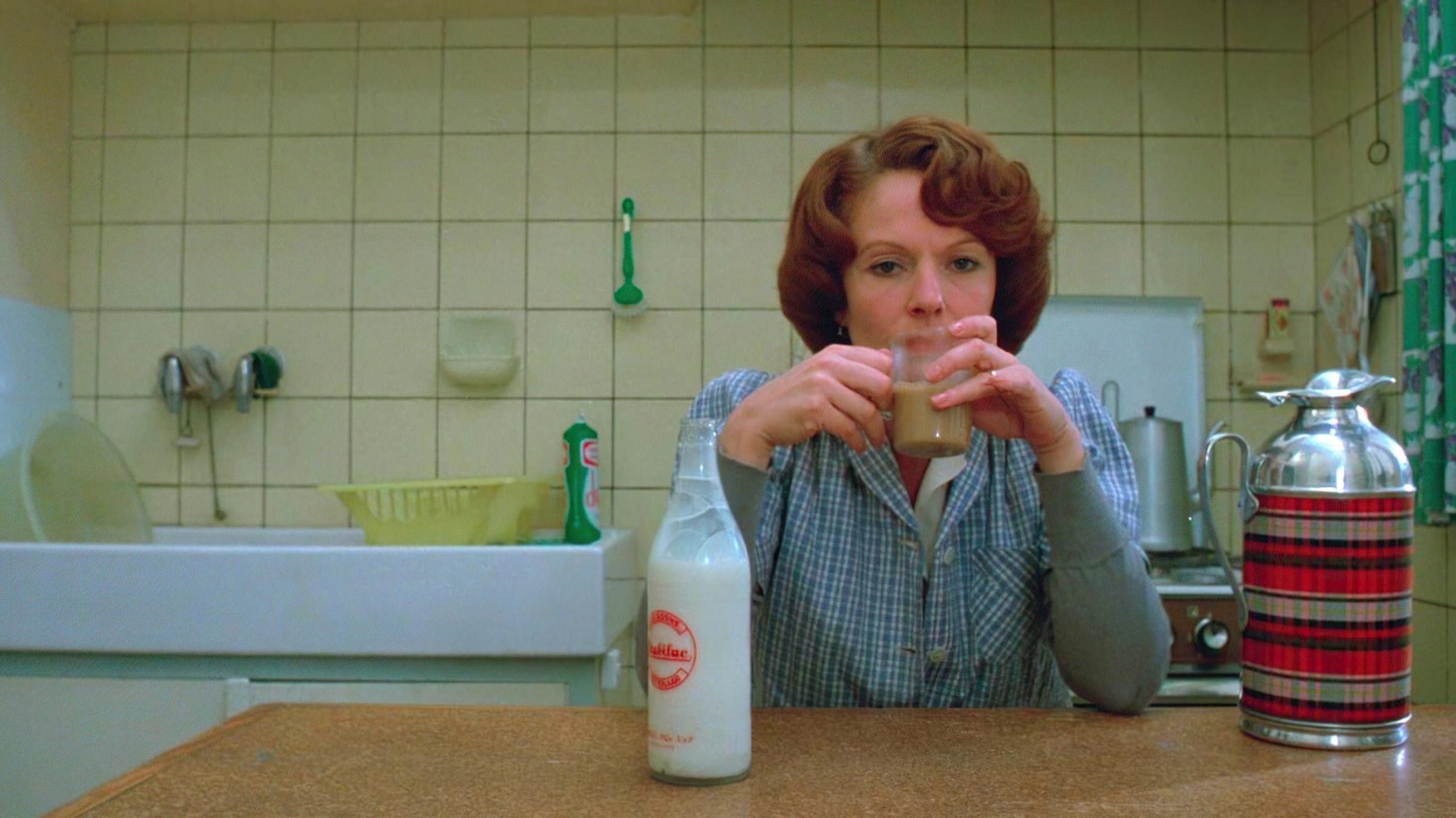
Jeanne Dielman, 23 quai du Commerce, 1080 Bruxelles was newly named “the greatest film of all time” in Sight & Sound Magazine’s once-a-decade poll of film enthusiasts. It’s a great honor for a great film, and we wanted to make the following available to you in case (and in hope) that you want to watch the film.
The following reflection is an excerpt from Come & See: A Christian Guide to the Greatest Films of All Time, Elijah Davidson’s collection exploring the work of God’s Spirit in the development of the cinematic art form. The material is available as a book and as a free devotional email, delivered each Sunday morning.
Because we have been journeying through film history together, we know that there were other great films about female experiences made by women before Chantal Akerman made Jeanne Dielman, 23 quai du Commerce, 1080 Bruxelles (1975). We have the benefits of more than fifty years of scholarship about films made by women as well as easier access to the films made across time and around the world. Neither was the case in 1975 when Jeanne Dielman was widely hailed as the first great feminist film. Our greater knowledge does not lessen the film’s greatness though, only its uniqueness. That the character “Jeanne Dielman” is very ordinary is kind of the point.
Jeanne Dielman (Delphine Seyrig, she whom we referred to as a ‘goddess’ in describing Last Year at Marienbad), a widow, keeps her own house. She cooks and sews and cleans and shops for herself and her teenage son. She makes money by turning a daily trick for a sad parade of nameless men. Her life is housework, sex – which she describes as “another detail” when she speaks of making love with the man she loved; imagine how she feels about these johns – and brief conversations with her son in the evening. Akerman involves us in Dielman’s tasks with a still camera that captures every moment of Dielman’s monotonous, anonymous life. Jeanne Dielman is a long, dreary film, but it isn’t nearly as long and dreary as the days Dielman is living.
We are used to appraising the physical attractiveness of actresses. We value them based on their apparent beauty. What is physical is so important in cinema, a visual, physical medium where all we really have to evaluate in a character is the way they look and move. But physical beauty is but one aspect of beauty, the glint of a greater glory. People are beautiful, and the world is beautiful, because they are complex and ineffable, endlessly fascinating creations of the eternal God.
Jeanne Dielman is a beautiful woman, her film reminds us explicitly, in both the apparent and ineffable ways, but her rich (think uranium) beauty has been compressed by the patriarchal system that has no place for her other than the kitchen and the bedroom. As her days drone on, we begin to see cracks in the casing. Jeanne Dielman is a warning, but society has denied women like Dielman an alarm to sound. Heed her silence. It is not peace.
Lord, have mercy.
Bind up the brokenhearted.
Set the captives free.
Lord, have mercy.
Have mercy.
Have mercy.
Jeanne Dielman, 23 quai du Commerce, 1080 Bruxelles was newly named “the greatest film of all time” in Sight & Sound Magazine’s once-a-decade poll of film enthusiasts. It’s a great honor for a great film, and we wanted to make the following available to you in case (and in hope) that you want to watch the film.
The following reflection is an excerpt from Come & See: A Christian Guide to the Greatest Films of All Time, Elijah Davidson’s collection exploring the work of God’s Spirit in the development of the cinematic art form. The material is available as a book and as a free devotional email, delivered each Sunday morning.
Because we have been journeying through film history together, we know that there were other great films about female experiences made by women before Chantal Akerman made Jeanne Dielman, 23 quai du Commerce, 1080 Bruxelles (1975). We have the benefits of more than fifty years of scholarship about films made by women as well as easier access to the films made across time and around the world. Neither was the case in 1975 when Jeanne Dielman was widely hailed as the first great feminist film. Our greater knowledge does not lessen the film’s greatness though, only its uniqueness. That the character “Jeanne Dielman” is very ordinary is kind of the point.
Jeanne Dielman (Delphine Seyrig, she whom we referred to as a ‘goddess’ in describing Last Year at Marienbad), a widow, keeps her own house. She cooks and sews and cleans and shops for herself and her teenage son. She makes money by turning a daily trick for a sad parade of nameless men. Her life is housework, sex – which she describes as “another detail” when she speaks of making love with the man she loved; imagine how she feels about these johns – and brief conversations with her son in the evening. Akerman involves us in Dielman’s tasks with a still camera that captures every moment of Dielman’s monotonous, anonymous life. Jeanne Dielman is a long, dreary film, but it isn’t nearly as long and dreary as the days Dielman is living.
We are used to appraising the physical attractiveness of actresses. We value them based on their apparent beauty. What is physical is so important in cinema, a visual, physical medium where all we really have to evaluate in a character is the way they look and move. But physical beauty is but one aspect of beauty, the glint of a greater glory. People are beautiful, and the world is beautiful, because they are complex and ineffable, endlessly fascinating creations of the eternal God.
Jeanne Dielman is a beautiful woman, her film reminds us explicitly, in both the apparent and ineffable ways, but her rich (think uranium) beauty has been compressed by the patriarchal system that has no place for her other than the kitchen and the bedroom. As her days drone on, we begin to see cracks in the casing. Jeanne Dielman is a warning, but society has denied women like Dielman an alarm to sound. Heed her silence. It is not peace.
Lord, have mercy.
Bind up the brokenhearted.
Set the captives free.
Lord, have mercy.
Have mercy.
Have mercy.

Elijah Davidson is Co-Director of Brehm Film and Senior Film Critic. Subscribe to Come & See, his weekly newsletter that guides you through the greatest films ever made, and find more of his work at elijahdavidson.com.
This reflection on Jeanne Dielman, 23 quai du Commerce, 1080 Bruxelles is an excerpt from Elijah Davidson’s collection exploring the work of God’s Spirit in the development of the cinematic art form. The material is available as a book and as a free devotional email, delivered each Sunday morning.